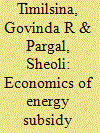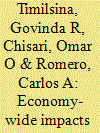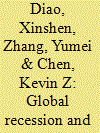|
|
|
Sort Order |
|
|
|
Items / Page
|
|
|
|
|
|
|
| Srl | Item |
| 1 |
ID:
176798


|
|
|
|
|
| Summary/Abstract |
As in many countries around the world, subsidies to energy in Bangladesh impose a significant fiscal burden, with benefits that disproportionately accrue to high-income households. Using a computable general equilibrium model, this study investigates the economy-wide impacts of the removal of direct subsidies in the electricity sector and indirect subsidy in natural gas in Bangladesh. The study finds that the removal of energy subsidies would be beneficial to the economy and would increase GDP. The magnitude of the economic impact depends on how the budgetary savings from the removal of electricity subsidy and the increased revenues due to the removal of indirect subsidies to natural gas are reallocated to the economy. Recycling the savings (or the new revenues) to fund investment would benefit the country most, followed by the case of utilizing them to fund cuts in income taxes, and finally to fund cuts in indirect taxes. While the reallocation of budgetary savings to households through lump-sum transfers is found inferior to other recycling options considered, it could be the preferred from the distributional perspective. However, further analysis is needed to confirm this.
|
|
|
|
|
|
|
|
|
|
|
|
|
|
|
|
| 2 |
ID:
119839


|
|
|
|
|
| Publication |
2013.
|
| Summary/Abstract |
Argentina is one of the world's largest biodiesel producers and the largest exporter, using soybeans as feedstock. Using a computable general equilibrium model that explicitly represents the biofuel industry, this study carries out several simulations on two sets of issues: (i) international markets for biofuel and feedstock, such as an increase in prices of soybean, soybean oil, and biodiesel, and (ii) domestic policies related to biofuels, such as an introduction of biofuel mandates. Both sets of issues can have important consequences to the Argentinean economy. The simulations indicate that increases in international prices of biofuels and feedstocks would increase Argentina's gross domestic product and social welfare. Increases in international prices of ethanol and corn also can benefit Argentina, but to a lesser extent. The domestic mandates for biofuels, however, would cause small losses in economic output and social welfare because they divert part of biodiesel and feedstock from exports to lower-return domestic consumption. An increase in the export tax on either feedstock or biodiesel also would lead to a reduction in gross domestic product and social welfare, although government revenue would rise.
|
|
|
|
|
|
|
|
|
|
|
|
|
|
|
|
| 3 |
ID:
110246


|
|
|
|
|
| Publication |
2012.
|
| Summary/Abstract |
A dynamic computable general equilibrium model is developed to assess the impact of the recent global recession and the Chinese government's stimulus package on China's economic growth. By designing two scenarios - one with and one without the stimulus package - the model results show that GDP growth rate in 2009 could have fallen to 2.9% without the stimulus package, mainly as a result of the sharp decline in exports of manufactured goods. Under the stimulus scenario, with the generated additional demand on investment goods, the Chinese economy grows 8-10% in 2009 and the succeeding years. The model also measures the overall gains of the stimulus package, and the cumulative GDP growth difference between the two scenarios for 2009-15 is about RMB76 trillion.
|
|
|
|
|
|
|
|
|
|
|
|
|
|
|
|
| 4 |
ID:
182755


|
|
|
|
|
| Summary/Abstract |
Broke out at the end of 2019, the novel coronavirus pneumonia (COVID-19) has been spreading throughout the world, leading to more than 87 million confirmed infections and 1.88 million fatalities. Motivated by this, we evaluate the economic impacts of COVID-19 outbreak on both national and industrial levels by employing quarterly computable general equilibrium (CGE) model. Our results reveal that the epidemic may lower China's economic growth in 2020 by 3.5%, versus 4.4% for final consumption (relative to baseline). The service industry suffers the most from the outbreak, and the Accommodation-Food-Beverage service, Wholesale-Retail Trade, and Transport-Storage-Post are identified as the most vulnerable sectors, with the negative impact on output reaching as high as 14.6%. When moving to 2021, the hit to economy shrinks to 2% (1.2–2.7%), with industry estimated to be the most affected sector instead. This study indicates that implementing effective measures for preventing and controlling the epidemic and policies for post-disease economic recovery play critical role in curbing the potential economic damage.
|
|
|
|
|
|
|
|
|
|
|
|
|
|
|
|
|
|
|
|
|